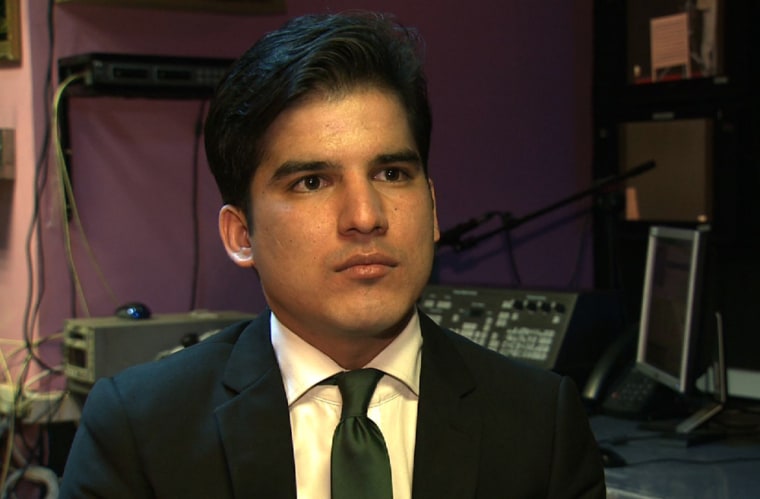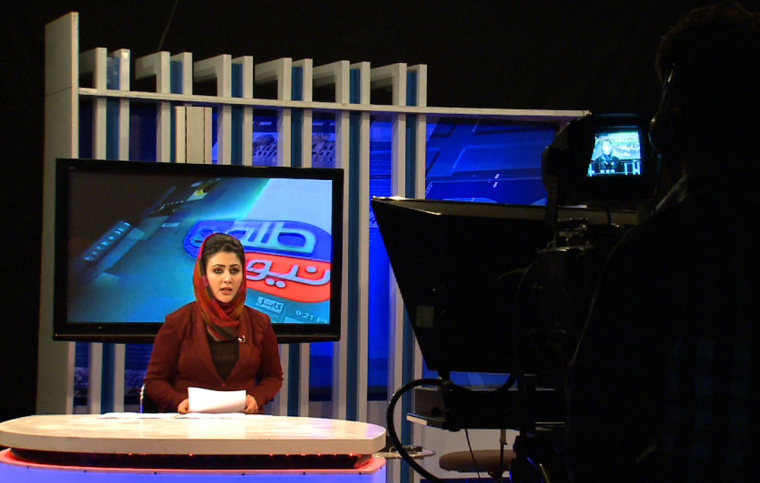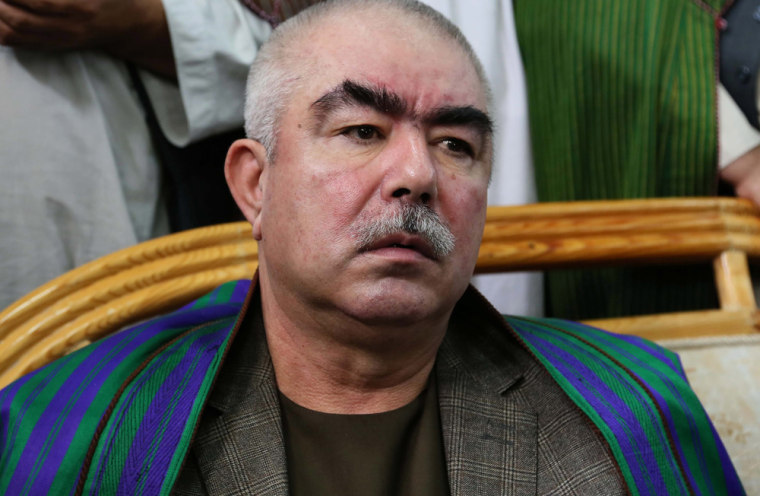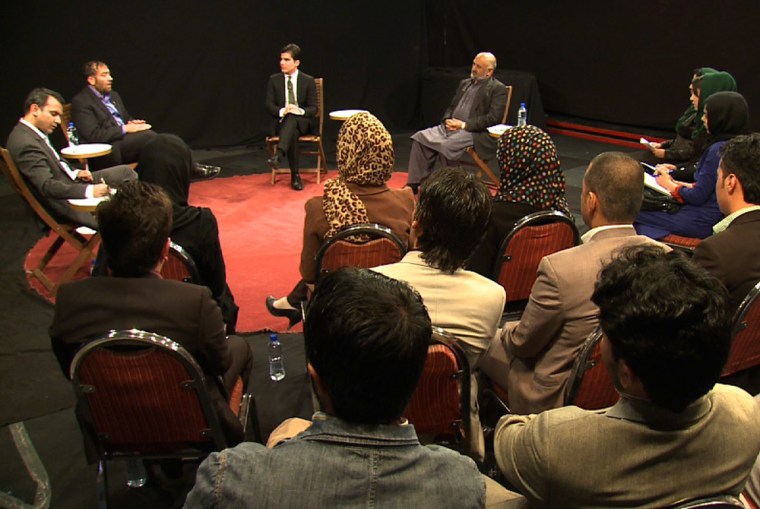American-style debates, polling and current affairs programming are bringing a whole new level of political punditry to Afghanistan as the country prepares to elect a new president.
Campaign managers, TV producers and pollsters are hot commodities in Kabul as live "town halls" and meet-and-greet interviews aimed at driving the democratic debate forward are getting more attention than ever before.
Despite a stubborn insurgency and an economy that the World Bank has warned will shrink as the U.S. and other Western powers begin their military withdrawal in 2014, the country's 30 national and more than 20 regional TV channels are thriving ahead of April's election.
Staff are being hired fast at Tolo (Dawn) TV, the country’s largest private television network, which claims to have 17 million viewers in a country of 30 million people. A seven-person "Election Cell," which includes a woman, burns the midnight oil at its headquarters in Kabul's exclusive Wazir Akbar Khan suburb.

Muslim Shirzad, 24, may well be Afghanistan’s version of Chris Matthews. With perfectly coiffed hair and trademark loud ties, the confident anchor is the tough-talker of the primetime circuit.
On the set of Tolo’s "Election 2014," a weekly town hall, Shirzad recently moderated a lively debate about how "neighbors are interfering in our elections."
Taking questions from university students, with young women seated in the front row, heads covered, he recently asked the country’s deputy speaker of parliament and election officials about China, Pakistan, India as well as Iran's alleged role in fueling the insurgency that threatens to derail the upcoming vote.
As many of the women thronged around him to snap pictures after the show, Shirzad cited the U.S.-style town hall format as a success.
"As most of the country is young, and media is young, and even our democracy is young, it makes sense to have young people participate in these debates," he said. "Hot topics like foreign interference is what young people want to watch."
Shirzad, who will also moderate the upcoming presidential debates, was matter of fact about mimicking American-style election programming.
"When we saw the presidential debates in the U.S., we saw professionalism," Shirzad said. "So while we may be copying the Americans, we are also going to become more professional about our politics, and adopt those high standards from U.S. programming."

According to one recent poll by TOLOnews, most Afghan women think that a former foreign minister should be the next president of the Islamic republic. But they are countered by a majority of urban men, who prefer a former university professor who taught economics in the U.S. as the man best suited for Afghanistan’s top job.
Still, in the south, where the Taliban insurgency is based - a majority of rural men support Quayum Karzai, a restaurant owner from Maryland, who happens to be the older brother of current Afghan President Hamid Karzai.
April's vote will mark the first democratic transfer of power since the Taliban fell in 2001. President Karzai was selected to head a transitional administration in Dec. 2001 and was chosen as interim head of state by a Loya Jirga the following year before winning elections in 2004 and 2009.
Karzai is barred by the constitution from running for a third term. He is widely expected to support his elder brother, who is considered one of the front-runners in the 11-candidate field.

It isn't just Tolo TV that is replicating American presidential campaign tactics. Candidates including warlord Rashid Dostum - who has been nicknamed the “Butcher of the North” for his violent role in Afghanistan’s bloody civil war in the 1980s and 1990s - have taken charge of their campaigns on social media.
Engaging in fiery late-night debates on Facebook and Twitter, he boasts a total of about 20,000 followers on social media -- a decent showing in a country with around 1 million Internet users.
A political operator famous for making and breaking alliances, Dostum has recently switched social media tactics and started a new Facebook group called “The Kingmaker General,” getting 3,000 likes in a matter of weeks. In October, the former warlord and Northern Alliance commander also issued an apology "to all who have suffered on both sides of the wars."
But because television is still the most powerful medium in mostly disconnected Afghanistan, Dostum -- who hopes to become vice president on a ticket with U.S.-educated former World Bank official Ashraf Ghani Ahmadzai -- has also invested in his own Aaina (Mirror) TV, the country’s first private network. Critics allege that the liberal broadcaster acts like Dostum's personal public relations agency by providing extensive coverage of his daily meetings and activities.
He is not alone in the buy-your-own-channel-and-run-for-office game: Abdulrab Rasoul Sayyaf, a hard-line Islamist warlord who fought the Taliban now runs the conservative Dawat (Preaching) TV, a channel which features no women or music.
Meanwhile, there were reports during the 2009 election about editors being pressured, even bribed for favorable coverage by candidates.
Mujib Khilwadgar of Nai, Afghanistan’s leading media watchdog, is concerned about the upcoming elections.“We believe that the pressure is going to be even more this time around because of decreasing foreign presence and oversight," he said.
When it comes to state-run broadcasters, some allege the bias toward authority is embedded.
As he strolled in the rose garden of his mansion with a force of heavily armed guards watching over the 20-feet walls, Dr. Abdullah Abdullah, a former foreign minister and runner-up in the last election who is running again, was skeptical about the government-owned TV station, RTA, the country’s most far-reaching broadcaster.
“In the last elections, at one of the largest rallies in the country’s history in Kandahar, I got 30 seconds of airtime,” complained Abdullah as he tapped his iPad 4 to check on his latest follower count. “Mr. Karzai, who was the incumbent, and had 300 people invited to his bunker, was broadcast live, and then repeated twice. I hope private media can correct that imbalance.”
NBC News' Fazul Rahim contributed to this report.
